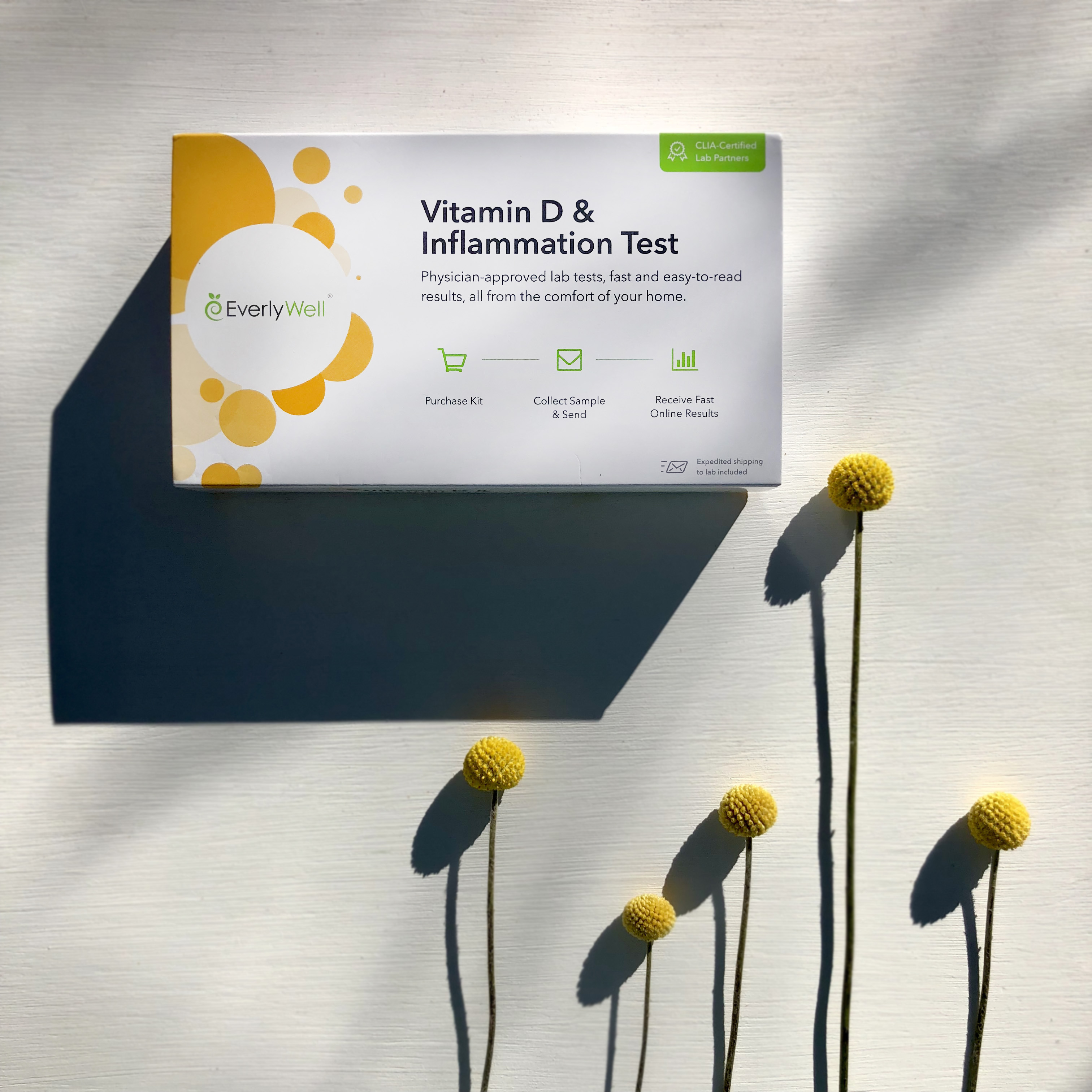
Vitamin D And Inflammation: What It Can Reveal About Your Health
It can lurk in your body for months and years – relentlessly damaging your tissues and organs – and it goes by the name “chronic inflammation.” Because chronic inflammation can quietly exist at a low level, its presence in your body isn’t always blatantly obvious. Nevertheless, chronic inflammation can slowly-but-surely chip away at your health and increase your risk for various diseases – including heart disease, diabetes, cancer, and Alzheimer’s. Here’s the good news though: you can test for chronic inflammation in your body with a simple use-it-at-home kit.
 You can test for chronic inflammation in your body with a simple use-it-at-home kit.
You can test for chronic inflammation in your body with a simple use-it-at-home kit.
That kit is EverlyWell’s Vitamin D and Inflammation Test – which checks your blood for key markers of inflammation.
But what exactly is inflammation – and what markers of inflammation does this test detect? Here, we’ll tackle each of these questions in turn.
WHAT IS INFLAMMATION?
Inflammation is what happens when your body responds to threats like microbial invaders, poisonous chemicals, and physical injuries. Signs of acute inflammation – in other words, short-term inflammation – include redness and swelling at the affected part of your body.
Acute inflammation is something you’ve likely experienced on-and-off throughout your entire life. For example, have you ever had a sore throat induced by a pesky cold? If so, it was because of inflammation in your throat area.
 Have you ever had a sore throat induced by a pesky cold? If so, it was because of inflammation in your throat area.
Have you ever had a sore throat induced by a pesky cold? If so, it was because of inflammation in your throat area.
In more detail, your throat became swollen because of the lymph nodes located there. Lymph nodes contain white blood cells that filter the lymphatic fluid looking for foreign invaders like bacteria and viruses – when they find them, they attack. When you have a cold, your lymph nodes often swell because of the inflammation caused by the white blood cells killing the invaders. So while your sore throat may have been quite irksome to you, it was actually an indication that your immune system was actively fighting against hordes of pathogens.
The last time you had a cold, the inflammation in your throat likely subsided after a few days (and you no longer dreaded the act of eating food or gulping down beverages). However, inflammation doesn’t always fade away after a short time. When it persists for months and years, it’s called chronic inflammation.
 Inflammation doesn’t always fade away after a short time. When it persists for months and years, it’s called chronic inflammation.
Inflammation doesn’t always fade away after a short time. When it persists for months and years, it’s called chronic inflammation.
Chronic inflammation is a totally different beast than acute inflammation. While acute inflammation is a protective response by your body, chronic inflammation can be incredibly destructive.
For example, when a certain type of bacteria – known as H. pylori – infects your stomach lining, you might get gastritis (inflammation of the stomach lining). At first, this inflammation may be acute and relatively short-lasting. But if the infection isn’t stopped, the inflammation can become chronic – increasing the risk of stomach cancer by up to 75%!
Chronic inflammation can also result from autoimmune disorders: your immune system malfunctions and goes to war against healthy tissue – unaware that your healthy tissue is not a threat.
MARKERS OF INFLAMMATION
Whenever inflammation occurs somewhere in your body – whether acute or chronic – the affected tissue sends a signal to your liver (via small molecules). This signal prompts your liver to unleash a flood of special molecules – dubbed “C-Reactive Protein” – into your bloodstream. And, as it turns out, C-Reactive Protein is one of the markers measured by EverlyWell’s Vitamin D and Inflammation Test.
WHAT IS C-REACTIVE PROTEIN?
Large amounts of C-Reactive Protein – or CRP – is released into your bloodstream as a response to inflammation, warning your body’s healthy tissues of a possible attack (perhaps from an army of pathogens). This gives your healthy cells time to muster their molecular defenses.
Since CRP molecules are rushed into your bloodstream whenever inflammation occurs, your blood’s CRP levels are a reliable indicator of inflammation in your body. Because EverlyWell’s Vitamin D and Inflammation kit makes use of a high-sensitivity CRP test (hs-CRP), it can spot very slight elevations of CRP in your blood – detecting even subtle, stealthy levels of inflammation in your body.
WHY SHOULD YOU TEST YOUR CRP LEVELS?
Chronic inflammation is a warning sign that something’s wrong in your body. Early clues of chronic inflammation include persistent pain in your joints or muscles, high blood pressure, and a feeling of lethargy that just doesn’t seem to go away.
 Early clues of chronic inflammation include persistent pain in your joints or muscles, high blood pressure, and a feeling of lethargy that just doesn’t seem to go away.
Early clues of chronic inflammation include persistent pain in your joints or muscles, high blood pressure, and a feeling of lethargy that just doesn’t seem to go away.
Chronic inflammation is also connected with more extreme health conditions, such as arthritis, inflammatory bowel disease, atherosclerosis, and cancer – to name just a few. And chronic inflammation can sneak up on you, too: you won’t always know you have it until it seriously harms your health. But you can take measures to protect against that possibility – like checking your CRP levels with EverlyWell’s Vitamin D and Inflammation Test.
WHAT IS VITAMIN D – AND HOW IS IT RELATED TO INFLAMMATION?
As its name implies, EverlyWell’s Vitamin D and Inflammation Test also checks your blood’s vitamin D levels. So what is vitamin D – and what does it have to do with inflammation?
Vitamin D is a fat-soluble compound that’s created when sunlight strikes your skin. Its importance to your wellbeing can hardly be overstated. For instance, vitamin D helps your body use calcium much more effectively, contributing to a healthier, stronger skeletal system. Vitamin D also supports the immune system. There’s also evidence that low levels of vitamin D are linked with higher levels of inflammation – which highlights the important role vitamin D plays in shaping your health.
 Vitamin D is a fat-soluble compound that’s created when sunlight strikes your skin.
Vitamin D is a fat-soluble compound that’s created when sunlight strikes your skin.
Many people don’t get enough vitamin D, partially because people are less exposed to sunlight today than in the past. In fact, vitamin D deficiency is so rampant – close to half of the world’s population have insufficient vitamin D levels – that some have called it an “epidemic.”
So checking your vitamin D levels is not only important in and of itself (given the high rates of vitamin D deficiency), but it’s also a useful way to discover if you have inflammation in your body.
WHY SHOULD YOU TEST YOUR VITAMIN D LEVELS?
Your body might try to tell you that you’re deficient in vitamin D by excessive sweating and fatigue. Other signs of vitamin D deficiency include depression and weakness.
Vitamin D deficiency can lead to osteoporosis – where your bones wear away (without getting repaired) and become brittle (which makes them break more easily). Young children who are vitamin D deficient can develop rickets. And, in pregnant women, low levels of vitamin D appear to increase rates of miscarriage.
For these reasons – coupled to the fact that a lot of people are vitamin D deficient – testing your vitamin D levels can be a crucial first step towards greater well-being.
![]() Testing your vitamin D levels can be a crucial first step towards greater well-being.
Testing your vitamin D levels can be a crucial first step towards greater well-being.
What’s more, your vitamin D levels can help reveal inflammation in your body – so when you check both your vitamin D and CRP levels, you can glean especially powerful insights on the state of your health.
CONCLUSION
Chronic inflammation is often a sign that your health is, in some way, at risk. Left unchecked, it can put your wellbeing in grave danger. Fortunately, however, you can test for inflammation by checking your CRP and vitamin D levels with EverlyWell’s Vitamin D and Inflammation Test. You can also measure your vitamin D levels separately through an at-home vitamin D blood test.
And after that? Consult with your healthcare provider to determine the next steps you can take to improve your health.